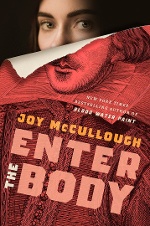Five questions for Joy McCullough
In Enter the Body (Dutton, 14 years and up), Joy McCullough creatively re-envisions the stories of several of William Shakespeare’s heroines. Sections formatted as playscripts bring Juliet, Ophelia, and Cordelia together to compare experiences while other female Shakespeare characters (most notably the silenced Lavinia from Titus Andronicus) look on. These three heroines, each in a poetic voice specific to her character, share, expand, and revise their tales in ways that are thought-provoking and often hopeful.
In Enter the Body (Dutton, 14 years and up), Joy McCullough creatively re-envisions the stories of several of William Shakespeare’s heroines. Sections formatted as playscripts bring Juliet, Ophelia, and Cordelia together to compare experiences while other female Shakespeare characters (most notably the silenced Lavinia from Titus Andronicus) look on. These three heroines, each in a poetic voice specific to her character, share, expand, and revise their tales in ways that are thought-provoking and often hopeful. See also our Women’s History Month tag and Women’s History Month 2023 coverage.
1. How well-versed were you with the source material before you started working on this book?
 Joy McCullough: I’m not a Shakespeare scholar, but I am a playwright with a theater degree and a longtime love of his plays. So I’d say I was very well-versed in the three primary plays explored in Enter the Body: Romeo and Juliet, King Lear, and Hamlet. And I had a solid high-level understanding of the role of women in Shakespeare’s overall body of work.
Joy McCullough: I’m not a Shakespeare scholar, but I am a playwright with a theater degree and a longtime love of his plays. So I’d say I was very well-versed in the three primary plays explored in Enter the Body: Romeo and Juliet, King Lear, and Hamlet. And I had a solid high-level understanding of the role of women in Shakespeare’s overall body of work.
2. What sort of additional research did you have to do?
Photo: Joe Iano.
JM: Obviously I re-read the plays, and I watched various adaptations of them as well. (One tiny upside of the pandemic was how so many theater companies made available high-quality recordings of their productions, including Shakespeare’s Globe in London.) I also dove into scholarly work on the role of women in Shakespeare. The most useful resource was a book called Performing Shakespeare’s Women: Playing Dead by Paige Martin Reynolds.
3. How did the format develop and what went into creating each character's poetic voice?
JM: I knew from the earliest stages that they would each be telling their stories in verse, and that they would be interacting with one another in a script format. I didn’t know if it would work, but I knew that’s what I was trying!
I was so thrilled that the Horn Book review articulated the distinction in the poetic voices of each character, because that was something I worked very hard on. I don’t identify as a poet, but I do feel like I understand character. I wanted each of their poetic voices to reflect the character’s personality. Cordelia, for example, leads troops into battle in the original play. So in my version, I expanded that so she’s had an interest in military strategy from the time she was young. By extension, I wanted her verse to be very structured and precise. Ophelia, on the other hand, is famous for her flower speech, so I expanded that to make her mother an herbalist, and I wanted her verse to feel like it was a living, growing thing. Having those goals in mind — structured verse, or plant-like verse — then translated into things like specific word choices and how the words were arranged on the page.
 4. How did you develop the expanded stories of other women in the characters’ lives?
4. How did you develop the expanded stories of other women in the characters’ lives?
JM: This was very important to me, because one of the things denied so many of the women in Shakespeare is the support of other women in their lives. Ophelia’s mother is never mentioned in Hamlet; Cordelia’s mother is only invoked as an insult; Juliet’s mother is a very flat, minor character. I wanted them to have mentors and full, rich lives. Not necessarily sunny happily-ever-afters; in my version, Cordelia’s mother has still died in childbirth. But she has an aunt and a ladies’ maid who are involved in her life.
5. Is there one of the characters you most identify with?
JM: In some ways I’m most closely aligned with the older women who are situated around the edges of the story, watching the younger ones reclaim their narratives and hopefully learning from them.
If I’m choosing from among the principal characters in the book, though, there are certainly pieces of me in all of them; that’s the nature of writing. But Cordelia has long been one of my favorite Shakespearean characters in one of my favorite plays. I remember reading it in high school — the first Shakespeare play I read that was not for a school assignment — and marveling at her. She’s trying to do what she believes is right and true, no matter the cost. She is fearless in her commitment to this ideal. In my version, she has that fearlessness, but we also see what it costs her; we see her doubts and regrets. I’m more plant-lady than military strategist, but at her core, I think I understand Cordelia the most.
From the February 2023 issue of Notes from the Horn Book.

RELATED
ALREADY A SUBSCRIBER? LOG IN
We are currently offering this content for free. Sign up now to activate your personal profile, where you can save articles for future viewing.







Add Comment :-
Be the first reader to comment.
Comment Policy:
Comment should not be empty !!!